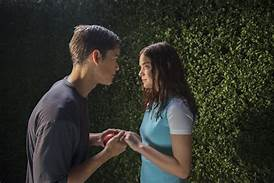This week we learned about lightning and the use of different variations of such to convey certain messages in the film. We used this knowledge to assess the use of such a technique in "The Giver" in a group assignment.
However, cinematography must first be defined. Cinematography is essentially the art and craft of making motion pictures capturing a story visually. A cinematographer, also known as a director of photography, presides over the camera and light crews on a film or video production and controls visual elements of the film's raw footage.
Cinematographers use lighting to create a visual mood, atmosphere, and sense of meaning for the audience. Lighting is simply the direction, quality, source, and color of light. It also creates the mood of a scene, shows the characters' emotions, directs the audience's attention, and supports the genre of a film.
Below shows a lighting assignment done with my group (Justin Rosario, Simone Watson, and Faith Carl)
Elements of Lighting | Definition | Connotations for genres, atmosphere, and tone | Image Reference |
D: Side Lighting | Side lighting refers to light that enters the frame from the side to highlight a person or object. It lights the actor from the side and focuses on the contours of their face for a high-contrast | The contrast helps add to the dramatic mood of the frame as Jonas makes the decision to pass the boundary of memory. The tone is very urgent and reveals the protagonist’s heroic side in the film. | 
|
D: Back Lighting | A backlight hits an actor or object from behind. It is placed higher than the object it is lighting.
Gives more shape and depth by reflecting light from another surface. Frames appear three-dimensional | Provokes a mysterious atmosphere as the protagonist enters the Giver’s dwelling. To the audience, the Giver is still an unknown character in this part of the film. | 
|
D: Under Lighting | Can either be used as monumental lighting or distort the subject’s features. | Create feelings of fear, curiosity, or awe in this part of the narrative. Alludes to a sci-fi movie by the prop (glasses). | 
|
Q: Hard Lighting | Hard lighting has clear, crisp shadows and contrast. | It creates a dramatic and intense atmosphere which is highlighted by the lighting and focuses the attention of the audience on Jonas’s conversation. | 
|
Q: Soft Lighting | Soft light has very little to no shadows and low contrast and recreates subtle shades of light from exterior sources. | Creates a romantic, dreamlike or magical atmosphere and is very bright and intriguing as it's a beautiful sunny day in the park. | 
|
S: Key Lighting | The key light is the main light illuminating a subject to highlight the form and dimension of the subject. | The angle creates contrast by lighting up half of the face, bringing your focus on the character, creating anticipation. | 
|
S: Fill Lighting | Used to illuminate the face enough so there is a controlled level of contrast. Lightens shadows to add details to dark areas of a scene. | By softening the shadows and decreasing contrast in this scene, the lighting is used to emphasize the worry on her face. | 
|
S: Natural Lighting | Nature’s illumination, utilizing the light source that isn’t artificial and is already available at a particular location. | The use of natural lighting adds a realism effect to a scene or film. It is a viable technique in the cinematic process. | 
|
S: Practical Lighting | A light source that is visible within the scene like lamps, light, fixtures, candles, and television sets. They’re not usually strong enough to light a subject, but they add to the cinematic ambiance of the scene. | Practical lighting can help give the audience a better sense of space and depth in a shot. It adds to the mood of the film, suggesting a warm feeling or etc. | 
|
C: Warm Lighting | Warm lighting creates yellow or orange tones. Think. Warm, sunny day by the beach. | Warm lighting plays a part in expressing joyful and cozy feelings in a film. | 
|
C: Cool Lighting | Cool lighting creates blue tones. Think of, cold and lonely night sky. | Cool lighting can suggest loneliness or thoughtfulness in a film. | 
|
Direction
Quality
Source
Color
References:
Lighting In Film.pptx
Tubi. (2014). The Giver. https://tubitv.com/movies/493082/the-giver
Comments
Post a Comment